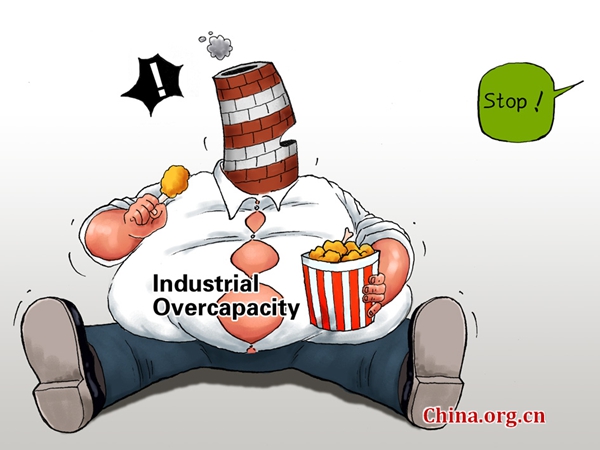Supply side reform a positive endeavor for businesses
- By Zhu Qiwen
 0 Comment(s)
0 Comment(s) Print
Print E-mail China Daily, January 14, 2016
E-mail China Daily, January 14, 2016
|
|
|
Dyspepsia [By Zhai Haijun/China.org.cn] |
The scary talk of millions of workers being laid off has heightened the pain of China's economic transformation, especially for those industries plagued by serious overcapacity such as coal, steel, cement and glass.
But that does not justify a pessimistic view of China's supply side reform that aims to address problems such as excess capacity, excess housing stock and unprofitable "zombie" companies.
Instead, the country's implementing of economic policies to facilitate industrial restructuring and improve the overall quality of goods and services provides an opportunity that all businesses can seize, not just the country's embattled manufacturers, as China becomes a consuming society.
In spite of the short-term impacts of China's economic slowdown, which has rattled international trade, commodities and finance, Christine Lagarde, managing director of the International Monetary Fund, threw her weight behind China's reform strategy when addressing central bankers at a conference in Paris on Tuesday.
She said that China's ambitious multiyear rebalancing of its economy is "a positive endeavor that in the long run, will benefit everybody."
This is a much-needed boost to the confidence of global policymakers in the face of the rough start to 2016, which has prompted warnings of a repeat of the 2008 global financial and economic crisis, because if policymakers allow themselves to be blinded by the immediate difficulties rather than the long-term picture, things could turn even uglier than expected.
Meanwhile, such high-profile recognition of the long-term benefits of China's economic transformation also represents a reminder of the necessity for all businesses to embrace the country's supply side reforms.
It is not only those factories struggling with excess industrial capacity and falling prices that have to remake themselves in line with the country's supply side reform, all companies, domestic and foreign, will need to adapt to the changing times.






